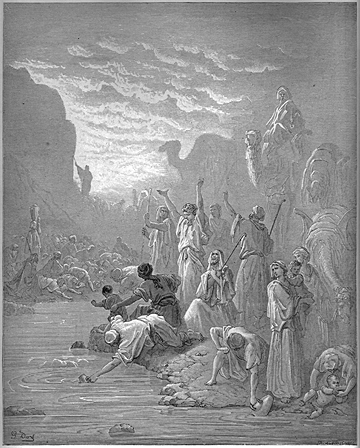Misirdin qiⱪix 17
1 Andin pütkül Israil jamaiti ⱪopup, Sin qɵlidin qiⱪip, Pǝrwǝrdigarning ǝmri boyiqǝ sǝpǝr ⱪilip, Rǝfidim degǝn yǝrgǝ kelip qedirlirini tikti. Əmma u yǝrdǝ hǝlⱪⱪǝ iqkili su yoⱪ idi.
Obeying what Yahweh commanded, all the Israeli people moved from the Sin Desert. They/We traveled from one place to another. They/We camped at [a place named] Rephidim, but there was no water there for (the people/us) to drink.
2 Xuning bilǝn hǝlⱪ Musa bilǝn jedǝllixip: — Bizgǝ iqkili su bǝrgin! — dedi. Lekin Musa ularƣa: — Nemixⱪa mening bilǝn jedǝllixisilǝr? Nemixⱪa Pǝrwǝrdigarni sinaysilǝr? — dedi.
So the people complained to Moses/me again, saying, “Give us water to drink!” Moses/I replied to them, “Why are you (criticizing/arguing with) me [RHQ]? And why are you trying to determine whether Yahweh [has the power to provide for you]?”
3 Lekin hǝlⱪ qangⱪap, su tǝlǝp ⱪilip, Musadin aƣrinip ƣotuldixip: — Sǝn nemixⱪa bizni, balilirimizni wǝ melimizni ussuzluⱪ bilǝn ɵltürüxkǝ Misirdin elip kǝlding? — dedi.
But the people were very thirsty, and they continued to complain to Moses/me. They were saying things like “Why did you bring us out of Egypt?”, and “Did you bring us here to cause us and our children and livestock to die (from thirst/because we had no water to drink) [RHQ]?”
4 Xuning bilǝn Musa Pǝrwǝrdigarƣa pǝryad kɵtürüp: — Bu hǝlⱪni ⱪandaⱪ ⱪilsam bolar?! Ular ⱨelila meni qalma-kesǝk ⱪilixi mumkin! — dedi.
So Moses/I prayed earnestly to Yahweh. He/I said, “(How shall I deal with these people?/I do not know how to deal with these people!) [RHQ] They are almost ready to [kill me by throwing] stones at me!”
5 Pǝrwǝrdigar Musaƣa jawabǝn: — Sǝn Israilning aⱪsaⱪalliridin birnǝqqisini ɵzüng bilǝn billǝ elip qiⱪip, [Nil] dǝryasining süyini urƣiningda ixlǝtkǝn ⱨasangni ⱪolungƣa elip hǝlⱪning aldiƣa barƣin;
Yahweh replied to Moses/me, “Take some of the elders/leaders of the Israeli people with you and [tell the rest of] the people to follow you [to Sinai Mountain]. Take along the stick with which you struck the Nile [River].
6 Mana, Mǝn xu yǝrdǝ, Ⱨorǝb teƣidiki ⱪoram taxning üstidǝ sening aldingda turimǝn; sǝn ⱪoram taxni urƣin. Buning bilǝn uningdin hǝlⱪⱪǝ iqkili su qiⱪidu, — dedi. Musa Israilning aⱪsaⱪallirining kɵz aldida xundaⱪ ⱪildi.
Listen carefully: I will stand in front of you on top of a [large] rock at the foot of the mountain. Strike the rock with your stick. [When you do that], water for the people to drink will flow out of the rock.” [When they/we arrived at the mountain], Moses/I did that while the Israeli elders were watching, [and water flowed from the rock].
7 Musa Israillarning jedǝllǝxkini wǝ ularning «Pǝrwǝrdigar arimizda zadi barmu-yoⱪmu?» deyixip Pǝrwǝrdigarni siniƣini üqün, u yǝrni «Massaⱨ» wǝ «Mǝribaⱨ» dǝp atidi.
Moses/I gave that place two names [in the Hebrew language: ] Massah, [which means ‘testing’], and Meribah, [which means ‘complaining’]. He/I gave it the name Massah because the Israeli people were testing Yahweh, saying “Is Yahweh really among us [and able to help us], or not?”, and he/I gave it the name Meribah because they were [continually] complaining.
8 Xu qaƣda Amalǝklǝr kelip Rǝfidimdǝ Israilƣa ⱨujum ⱪildi.
Then the descendants of the Amalek people-group came and fought against the Israeli people at Rephidim.
9 Musa Yǝxuaƣa: Sǝn ɵzimizdin Amalǝk bilǝn jǝng ⱪilixⱪa adǝm talliƣin. Mǝn ǝtǝ Hudaning ⱨasisini ⱪolumƣa elip dɵngning qoⱪⱪisida turup turimǝn, dedi.
Moses/I said to Joshua, [who was one of our army/Israeli leaders], “Choose some men to go out and fight against the Amalek people-group tomorrow. I will stand on the top of the hill, holding the stick that God told me to carry.”
10 Yǝxua Musa buyruƣinidǝk ⱪilip, Amalǝklǝr bilǝn jǝng ⱪildi. Musa, Ⱨarun wǝ Hur dɵngning qoⱪⱪisiƣa qiⱪti.
So Joshua did what Moses/I told him to do. He took some men to fight against the Amalek people-group. [While they were fighting], Aaron, Hur, and Moses/I went up to the top of the hill [so that they/we could see the whole battle area].
11 Xundaⱪ boldiki, Musa ⱪolini kɵtürüp tursa, Israil ƣalib kelǝtti, lekin u ⱪollirini pǝskǝ qüxürüp tursa, Amalǝk ƣalib kelǝtti.
Whenever Moses/I lifted up his/my arms, the Israeli men started to win [the battle]. And whenever he/I lowered his/my arms, the Amalek people-group started to win.
12 Musaning ⱪolliri eƣirlixip kǝtti; ular bir taxni elip kelip uning astiƣa ⱪoydi; u uning üstidǝ olturdi; andin Ⱨarun bilǝn Hur biri bir tǝripidǝ, biri yǝnǝ bir tǝripidǝ uning ⱪollirini yɵlǝp turdi; bu tǝriⱪidǝ uning ⱪolliri taki kün patⱪuqǝ mǝzmut turdi.
But his/my arms became tired. So Aaron and Hur [rolled] a [large] stone for Moses/me to sit on. [While he/I was sitting on it], those two held up his/my arms, [one on one side and the other on the other side]. In that way, they kept his/my arms lifted up, and his/my arms held steady until the sun went down.
13 Xundaⱪ ⱪilip, Yǝxua Amalǝk wǝ uning hǝlⱪini ⱪiliqlap nabut ⱪildi.
So Joshua and the men with him completely defeated the Amalek people-group, using their swords [to fight against them].
14 Pǝrwǝrdigar Musaƣa: — Bir ǝslimǝ bolsun dǝp bu ixlarni bir kitabⱪa yezip ⱪaldurƣin, xundaⱪla xularni Yǝxuaning ⱪulaⱪliriƣa oⱪup bǝr; qünki Mǝn Amalǝkning namini asmanlarning astidin, ⱨǝtta adǝmlǝrning esidinmu mutlǝⱪ ɵqürüwetimǝn, dedi.
Then Yahweh said to Moses/me, “Write an account of this battle, and then read it to Joshua. [Also write that some day] I will completely get rid of the Amalek people-group.”
15 Andin Musa bir ⱪurbangaⱨni yasap, namini «Pǝrwǝrdigar tuƣumdur» dǝp atidi
Then Moses/I built a [stone] altar there and named it ‘Yahweh is [like] my flag’.
16 wǝ Musa: — Yaⱨning tǝhti aldida bir ⱪol kɵtürülüp: — «Pǝrwǝrdigar ǝwladtin ǝwladⱪiqǝ Amalǝkkǝ ⱪarxi jǝng ⱪilidu» deyilgǝnidi, — dedi.
He/I said, “Hold high Yahweh’s flag! Yahweh will continue to fight against the Amalek people-group (forever/in all future generations)!”





















